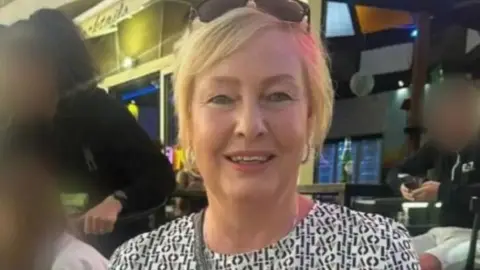Rabies death sparks 'jump in vaccine inquiries'
 Facebook
FacebookThe death of a British grandmother from rabies after she was scratched by a puppy while on holiday has sparked a surge in the number of travellers seeking advice about vaccinations, a pharmacist has said.
Yvonne Ford, 59, from Barnsley, died in hospital in Sheffield on 11 June after having light contact with the stray dog during a family trip to Morocco in February.
Pharmacist Olamide Olokanmi said that, following news of the tragic case: "We've had a lot of phone calls asking about it."
He said his pharmacy in Otley, West Yorkshire, had stocked up on the jab but he was concerned that an increase in demand may lead to a shortage of supply.
"We frequently have supply issues with vaccines, especially when there's a high demand for them, and rabies notoriously seems to be one of them," said Mr Olokanmi.
"Year-on-year we always have that problem, so I do foresee that being a problem.
"There would then be a wait for it to come back in or we'd have to go to another manufacturer which then drives up the price of the vaccine."
It currently costs up to £330 for a three-dose rabies vaccine.
'Lots of calls'
Mrs Ford's death from the the virus was the first in the UK since 2018 when a British man was bitten by a cat in the same African country.
Mr Olokanmi said there had already been an upsurge in the number of people seeking advice about whether to get the vaccination before travelling to high-risk regions such as Asia, Africa and Central and South America.
Before news of Mrs Ford's death, most people accessing the pharmacy's travel clinic opted not to get the jab, he said.
Mr Olokanmi added: "We had one lady come in on Wednesday night who is going on holiday to Morocco.
"She wasn't going to get the vaccine but after hearing what happened to this lady she changed her mind.
"A young man has also come in who is going to Morocco and we've had a lot of phone calls from people asking about it."

Dr Chris Smith, consultant virologist at the University of Cambridge, said rabies was a "big international problem" but very few people in the UK were affected.
"We never take risks with rabies. It's universally fatal if you catch it with very few exceptions."
Dr Smith, who heads up the university-based The Naked Scientists podcast, added: "Most of the infections we see come from stray dogs and feral cats.
"It's very tempting when you see a cute looking puppy or kitten and think, I'll just pet that. But if they've got rabies their behaviour changes.
"They can scratch or bite you and rabies is spread in the saliva of an infected animal and it's then injected into the wound site either by the scratch or bite.
"Once it's in you, you have very little time for us to intervene to block it before it gets into the nervous system with fatal consequences.
"If the worst did happen, thankfully we can intervene but you have to do that promptly. Act immediately and in most countries medical facilities know what to do."
 Chris Smith
Chris SmithThe London School of Hygiene and Tropical Medicine said the latest case involving Mrs Ford underscored "the importance of awareness and timely treatment" for UK travellers.
Meanwhile, the Association of British Travel Agents (ABTA), said under its code of conduct, it required its members to direct customers to the UK government's travel advice when planning and booking their trip.
Emma Brennan, from the organisation, said: "The UK Foreign Office does do a lot to raise awareness of checking this advice and we support them in that, and their work with industry."
